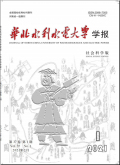华北水利水电大学学报(社会科学版)2024,Vol.40Issue(3):48-56,9.DOI:10.13790/j.ncwu.sk.2024.032
基于系统动力学的煤矿人机协作行为仿真研究
Research on Coal Mine Human-machine Cooperation Behavior Simulation Based on System Dynamics
摘要
Abstract
In order to ensure the safe cooperation between humans and machines in the intelligent con-struction of coal mine and reduce the occurrence of cooperation accidents,a theoretical model of human-ma-chine cooperation behavior in coal mine is constructed from the three aspects of miners'personal,intelligent system,and safety management by combining the theory of accident causation and the theory of rational ac-tion,and the factors influencing human-machine cooperation behavior are explored.Based on the system dy-namics method,we investigate the relationship between the influencing factors of human-machine cooperation behavior in coal mines and conduct dynamic simulation on the evolution trend of human-machine cooperation behavior.It is found that in the intelligent construction of coal mines,automation trust,team safety manage-ment and organizational safety management have obvious inhibiting effects on unsafe cooperative behaviors at different stages of human-machine cooperation,and the joint intervention has obvious inhibiting effects on un-safe cooperation behaviors.Based on the simulation results,the policy suggestions to improve the human-ma-chine safety cooperation behaviors in coal mines are proposed from the aspects of individual miners,organiza-tional safety management,and team safety management.关键词
煤矿安全管理/智能化建设/人机协作/系统动力学/仿真模拟Key words
coal mine safety management/intelligent construction/human-machine cooperation/system dynamics/analogue simulation分类
资源环境引用本文复制引用
杨雪,邢琦钰,姚雨佳..基于系统动力学的煤矿人机协作行为仿真研究[J].华北水利水电大学学报(社会科学版),2024,40(3):48-56,9.基金项目
国家自然科学基金项目(71573086) (71573086)
华北水利水电大学网络舆情与社会治理创新团队(01) (01)
华北水利水电大学研究生创新课题资助项目(YK-2021-119) (YK-2021-119)

